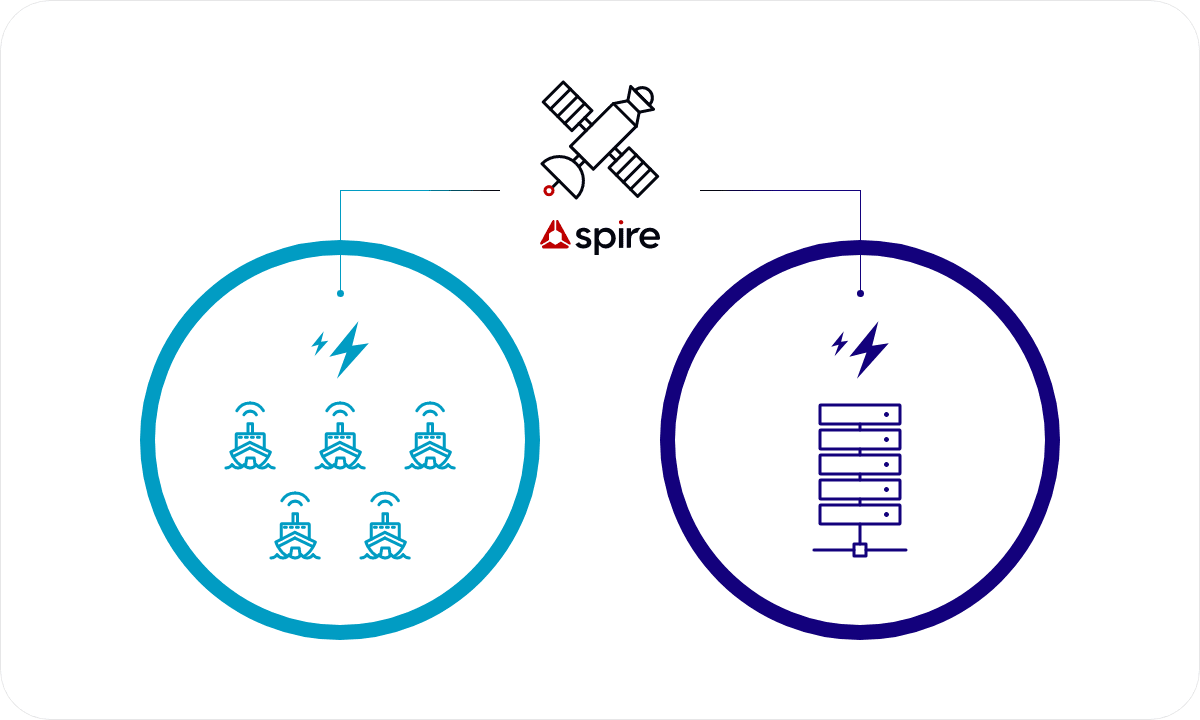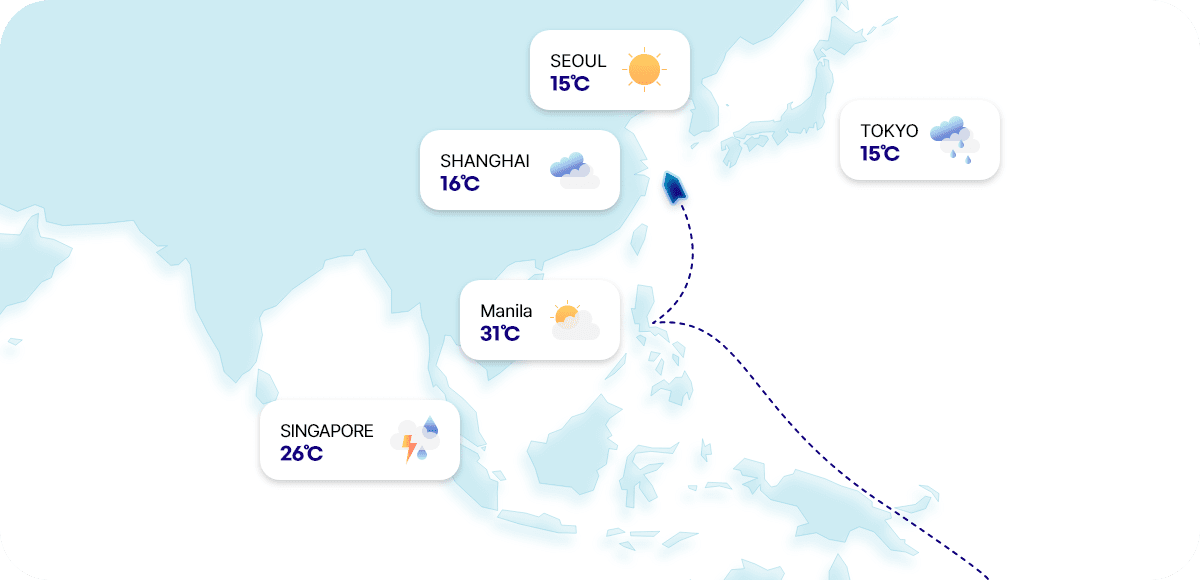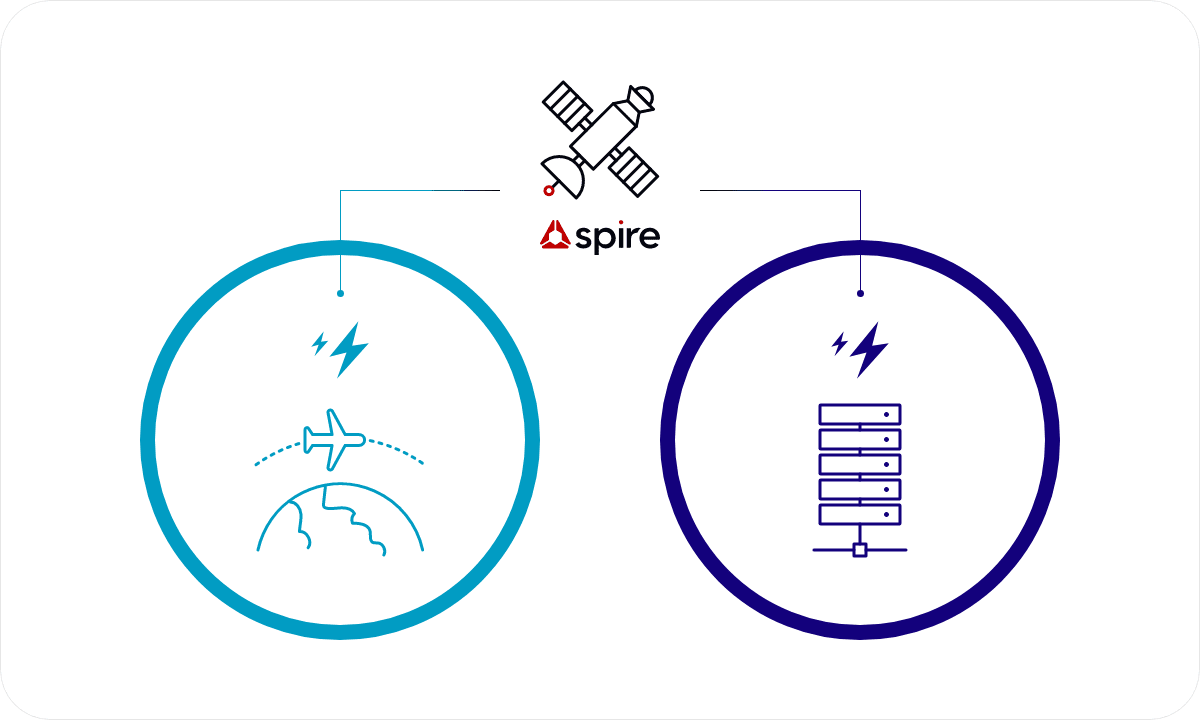Spire Global provides a variety of data analysis, information, and
solutions using artificial satellites,
including Earth's weather,
maritime conditions, and the positions of aircraft and vessels.

Spire Global possesses a top-tier satellite infrastructure.
AIS, transmitted by shipborne transceivers as a legal requirement, provides data collected by exactEarth & Spire satellites, on land and from maritime authorities, regarding ship locations.
Providing historical, current, and forecast weather data from around the world collected by Spire's satellites.
ADS-B, transmitted by aircraft transponders as a legal requirement, offers aircraft identification services through Spire's satellites for tracking aircraft positions.
Ground Station
Satellite in Operation
Eco Marine is the official reseller of Spire Global in Korea.
AIS (Automatic Identification System) is a statutory device
that automatically transmits the location of a vessel.
The system that collects ship location information by mounting
an AIS receiver on a satellite is called satellite AIS.

provided worldwide via 100+ low Earth orbit satellites.
provided by exactEarth's satellite AIS service through Cross Link technology installed on satellites, ensuring zero latency.
service offering ship location information in shadow zones through AIS receivers attached to 3,500 vessels.
Possessing a decade's worth of AIS data from 280,000 vessels worldwide.
Spire’s Historical AIS Data is a global archive providing
the most complete picture of AIS history data on the market,
for the most complete shipping analysis.
Advancing filtering options including date and time range,
geographical area, AIS message type, ship MMSI list, ship
type, and vessel flag allow you to tailor the data to your
unique requirements. Access to raw data is also available,
allowing you to uncover information beyond what is captured
in a live feed.
Most complete historical AIS data set since 2010
- No data gaps, allowing you to have complete coverage
Strongest historical AIS dataset on the market
- Enhanced with other data sources
Ability to curate your exact data set with competitive
pricing adjusted to your sample settings
- Select vessels, date range, and area of interest most
relevant to your business
Flexible delivery formats, to adapt to your use case
- CSV, JSON, NMEA, XML, KML, Shapefile or as density maps
Historical AIS provides a valuable resource for retrospective analysis, trend identification, and informed decision-making. Gain insights into long-term maritime activities and behaviors, which can lead to improved operational efficiency, better resource allocation, and more accurate research outcomes.
Container, goods performance / tracking for logistics
- Optimize supply chain management, estimate transit times
more accurately, and identify areas for operational
improvements.
- Analyze historical movement of cargo vessels over time.
- Review past vessel routes, arrival times, and port
activities to identify patterns and trends in logistics
operations.
Shipping operations
- Invaluable data for tracking and managing shipping
operations.
- Assess historical fleet performance
- By analyzing past routes, delays, and performance metrics,
identify factors that contribute to operational
inefficiencies, plan maintenance schedules, and make
informed decisions to enhance overall fleet performance.
Commodity / market intelligence
- Study historical shipping trends, route changes, and cargo
volumes to understand long-term patterns and anticipate
market shifts.
- Combining historical AIS data with other relevant
information, such as global events or economic indicators,
gain deeper insights into supply and demand dynamics for
various commodities.
University Research
- Analyze historical vessel movements to study maritime
traffic patterns, environmental impacts of shipping, or the
effects of maritime regulations.
- Use Historical AIS to support academic studies on maritime
transportation, climate change, marine conservation, and
other fields.
Whether you are interested in an API subscription or a one-time data buy, Spire Maritime can offer different delivery methods to adapt to your needs.
- One-time buy, no subscription
- AIS historical data via a download link, SFTP or physical
format
- Cost adjusted to your specific sample settings
Advanced RF signal-based vessel detection and tracking to validate vessels’ positions based on the unique real time coverage offered by the Spire constellation.
Using additional RF data through doppler frequency shift and associated accurate timing data collected at the time of receipt of transmitted AIS messages, AIS Position Validation independently calculates a vessel’s location at the time of AIS transmission (even if AIS messages do not include valid GPS data).
This can be compared to the reported position contained within the AIS messages received from a vessel.
- Continuous global coverage
- Calculated position and timestamp in any given 24 hour
period since October 2022
- Distance between reported and calculated position
- Range of event types, each with timestamp and timestamp
- Real time information (data takes 20 mins to process)
Spire Maritime’s leading Standard Automatic Identification System (AIS) vessel tracking data provides an up-to-date and accurate view of the world’s shipping activities.
- Global ocean coverage based on our proprietary satellite
constellation
- All active AIS devices detected with over 600K vessels,
250K+ active vessels/day
- Vessels you can track: 1) All vessels, 2) All vessels of a
specific type, 3) A specific fleet, or 4) individual vessels
with either AIS Class A or Class B transponders.
- Static, positional and voyage related data
- Near real time refresh near shore (average of 1 min)
- Standard refresh in the Open Ocean (average of 6 mins)
Spire’s Standard AIS provides unrivalled vessel tracking
through our ever-expanding set of data sources.
Spire Maritime’s Standard Satellite AIS is powered by our
Low Earth Multi-Use Receiver (LEMUR) satellite
constellation. This constellation, consisting of hosted VHF
maritime receiver payloads, collects global radio frequency
data in near-real-time from nanosatellites equipped with
multiple sensors. The data is then delivered with low
latency through the world’s largest network of ground
receiving stations dedicated to small satellites. This
satellite data forms the foundation of our service. We fuse
this satellite data with information from various additional
sources, such as terrestrial AIS stations, to provide a
comprehensive view of maritime activities.
This
approach, combined with our globally distributed satellite
operations and IT support teams, ensures a reliable and
continuous service.
With the largest team of Satellite
AIS technology experts and specialists in the world, Spire
Maritime is committed to delivering world-class capabilities
to our customers.
Most complete source of AIS data
Spire Maritime has the largest constellations and highest
volume of messages tracked by satellite. Combined with other
trusted data sources, we offer the most complete picture of
AIS data on the market.
Track vessels anywhere and at any moment in time
Increase your situational awareness by accessing vessel
positions worldwide or in areas of interest.
Leverage accurate and actionable data
Make better‑informed decisions, even in highly congested
traffic areas, with enhanced vessel detection.
Maintain a competitive edge
Create strong domain awareness based on high data quality
and accurate information.
Resource efficiency
Free up your most valuable resource, your team, by
leveraging Maritime 2.0 GraphQL for cleansed data and
platform extensibility.
Container, goods performance / tracking for logistics
- Track cargo vessels carrying containers and goods.
- See progress of shipments, estimate arrival times, and
improve supply chain management.
- Identify potential delays or disruptions in the logistics
chain.
Commodity / market intelligence
- Insights into shipping activities related to commodities
to make informed decisions in commodity trading and
investment.
- Analyze vessel movements and traffic patterns, assess
shipping volumes, identify trends in commodity
transportation, and anticipate potential supply chain
disruptions.
Vessel performance / route optimization
- AIS data supports voyage optimization by providing
information about vessel performance and route
efficiency.
- Make informed decisions to optimize routes for fuel
efficiency, reduced emissions, and shorter transit times,
leading cost savings and improved environmental
sustainability.
Shipping operations
- Invaluable data for tracking and managing shipping
operations.
- Assess historical fleet performance
- By analyzing past routes, delays, and performance metrics,
identify factors that contribute to operational
inefficiencies, plan maintenance schedules, and make
informed decisions to enhance overall fleet performance.
Spire Maritime’s Real‑time Automatic Identification System (AIS) provides an up-to-date and accurate view of the world’s shipping activities.
Real-time AIS is based on an interconnected satellite architecture to provide real time coverage and instant visibility into maritime activities, in the open ocean and near shore.
- Latency: less than 1 minute in the open ocean
- Global ocean coverage based on our proprietary satellite
constellation
- All active AIS devices detected with over 600K vessels,
250K+ active vessels/day
- Vessels you can track: 1) All vessels, 2) All vessels of a
specific type, 3) A specific fleet, or 4) individual vessels
with either AIS Class A or Class B transponders.
- Static, positional and voyage related data
Spire Maritime’s Real-time Satellite AIS is powered by a system of advanced VHF maritime satellite payloads hosted on the Iridium NEXT satellite constellation. These payloads collect global radio frequency data in near-real-time from satellites equipped with multiple sensors. The data is then delivered in real-time through the satellite system’s in-orbit ‘mesh’ architecture, which ensures continuous global surface coverage.
This real-time satellite data forms the foundation of our service. We fuse this satellite data with information from various additional sources, such as terrestrial AIS stations, to provide a comprehensive view of maritime activities. This approach, combined with our globally distributed satellite operations and IT support teams, ensures reliable and continuous service. With the largest team of SAT-AIS technology experts and specialists in the world, Spire Maritime is committed to delivering world-class capabilities to our customers.
Only constellation providing Real-time AIS on the market
Track vessels activities anywhere as they happen
Increase your situational awareness by accessing real‑time
vessel positions in waters of interest
Most complete source of AIS data
Access the largest constellations and highest volumes of
messages tracked by satellite. Combined with other trusted
data sources, we offer the most complete picture of AIS data
on the market
Unique domain awareness
Based on high quality data and accurate information, track
any vessels, including for a specific vertical, customers or
competitor
Utilizing the AI technology owned by Eco Marine,
we
provide data processing services.
The Spire Weather service utilizes Radio Occultation technology from over 100 meteorological satellites, collecting thousands of atmospheric data points daily. It monitors pressure, humidity, temperature, and more, from around the world and especially from remote and maritime regions.
Spire provides historical, current, and future forecast data collected from 100+ Radio Occultation satellites.
Possessing 30 years of global historical data.
(Updated every 1 hour)
Updating global weather on an hourly basis.
(3 km resolution)
Predictive data for global or regional forecasts.
(10 days forecast)
Through maritime-focused weather capabilities, we offer services for optimal recommended routes for ships, as well as weather and forecast information specific to ports.

Spire Weather utilizes weather sensors, Spire's satellite weather observations, and other sources to learn weather patterns in specific regions, combining machine learning techniques to create accurate forecasts.
Accessing customized weather forecasts for specific locations, allowing efficient work planning and ensuring maximum accuracy, thus enhancing business productivity.
Spire Weather is a unique solution for a reliable global weather forecast powered by the largest private weather observation satellite constellation.
Voyage Optimization
A multi-objective voyage optimization algorithm.
Calculating routes based on all key drivers behind voyage
decision making.
Complete solution delivered through API and integrated
with Spire’s satellite-based weather forecasts.
Flexible to meet your technology infrastructure. Can be
delivered with built-in vessel performance models or
integrated to your in-house developed ones.
Global Weather Forecast
15-day weather forecast anywhere on the planet, in 12-km
(1/8-th degree) resolution.
Dozens of weather parameters for the atmosphere and
oceans, with multiple packages dedicated to the Maritime
industry (including probabilistic forecasts).
Available for Global download (GRIB2), per coordinate or
per vessel route retrieval (JSON).
Historical Weather
Historical weather data anywhere on the planet since
1990.
Available in 12-km (1/8-th degree) resolution.
Integrated with AIS historical data to easily retrieve the
weather conditions faced by vessels in the past.
Also available for global download (GRIB2).
Port Weather Forecast
A dedicated weather forecast for ports, with hourly
weather for the next 15 days.
Weather forecasts updated every hour.
Forecasts tuned individually for each port, combining
local observation with different weather models by using
advanced ML techniques.
Maritime Insights
Maritime Insights delivers a forecast of the weather
impact to shipping operations.
Based on the vessel characteristics, load, and a desired
route, the API can calculate a forecast of the weather
risk for the cargo, crew, and vessel, or the range of
impact the weather has on the vessel performance.
Storm Tracks
Historical, current, and forecast tropical cyclone tracks
with aggregated data from the NHC, CPHC, and JTWC.
Global coverage, all basins.
Available in JSON or KMZ for visualization.
Current Weather
Global high-resolution (3-km) overview of current weather
conditions.
10 atmospheric variables available, updated every hour.
Tides
Global astronomical tides data from 1990 to five years
from now.
Hourly tides or peaks, available in JSON format.
Collecting data from ports and 10,500 weather observation stations to provide forecasts.
ADS-B stands for Automatic Dependent Surveillance - Broadcast. It is a system that autonomously collects aircraft information such as position, altitude, and speed at regular intervals. It plays an increasingly vital role in various aspects of the aviation industry, contributing to safety and efficiency enhancements.

Real time/past
Flight tracking service
API provided
Tail Number, Aircraft Code, Aircraft Code Type name, Airline code, Airline name
Flight Number, Departure time, Arrival time, Departure Aircraft Code, Arrival Aircraft Code, IATA and ICAO codes
Estimated time of arrival estimated time of departure Takeoff time, Landing time
Easily access live and historical flight information
- Airline KPIs – OTP, cost and performance insights, fuel
burn insights
- Airport insights – off/on block time, holdings, gate and
runway information
- Top operators, airports, destinations
- Routes data and carbon emissions insights
- Overflight information – Flight Information Regions(FIR),
billing, entry/exit times
- Aircraft utilisation insights
- Travel and cargo capacity insights
- Fleet insights
Air Cargo & Logistics
- Track & Trace your shipments
- Smarter digital operations with automated flight alerts
- Market intelligence about cargo capacity and airport
congestion
Aviation sustainability solutions
- Fuel optimization and flight analytics
- Build carbon emissions models and offset tools
- Contrail management solutions
Insurance, MRO & aircraft leasing
- Most up-to-date overview of your aircraft utilization
(hours and cycles)
- Airline OTP/TAT performance and network analysis
- Risk management for monitoring aircraft asset exposure and
contract compliance